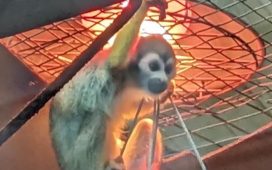
An African penguin inspects the new nesting boxes at Boulders Penguin Colony.
PHOTO: Supplied by SANParks
- Sixty penguin couples at Boulders Penguin Colony will get upgraded nesting boxes.
- The nesting boxes are essential for colonies which are exposed to predation and other environmental pressures.
- The project is set to improve breeding conditions and is aimed at boosting the population numbers.
Just in time for Valentine’s Day, 60 penguin couples will get upgraded love nests to encourage the romance.
But behind the project to replace the artificial nesting boxes at Boulders Penguin Colony is more than just love for these little seabirds – it’s hoped it will help boost the population numbers of the endangered species.
The new nesting boxes are set to improve breeding conditions for the endangered African penguins at the colony within the Table Mountain National Park (TMNP), SANParks spokesperson Reynold Thakhuli said.
The nesting boxes are essential for colonies which are exposed to predation and other environmental pressures, and are a conservation intervention to replace lost habitat.
It was first introduced to Boulders in 2003, with 62 formacrete nest boxes installed. Over the years, these have been adapted based on their efficacy and on-site monitoring.
The latest design is made of a geotextile fabric that is both non-toxic and environmentally friendly. The design is based on the naturally dug burrows, made with guano, of penguins and will add to the 50 boxes that were installed last month.
Thakhuli said:
The nest boxes provide safety from predators and limits exposure to adverse weather conditions, such as extreme heat and heavy rain leading to floods. The overall population of the African penguin is declining and various interventions are in place to assist with increasing their numbers.
“It is believed that providing artificial nests will assist in breeding success of the African penguin and therefore assist in increasing the overall population of the African penguin,” Cape Research Centre marine biologist Alison Kock said.
This project will be monitored carefully to determine the efficacy of design and nesting success, and these outcomes will be incorporated into new designs.













